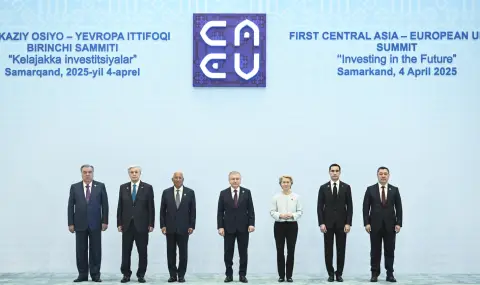On the sidelines of the “Central Asia – European Union” summit, a conversation was held between Kassym-Jomart Tokayev and the President of the European Commission Ursula von der Leyen. During the meeting, the prospects for the development of cooperation between Kazakhstan and the European Union in various sectors of the economy, digitalization and innovation were discussed. The parties positively assessed the start of procedures for concluding an agreement on simplifying the visa issuance procedure between Kazakhstan and the European Commission.
Kassym-Jomart Tokayev emphasized that the Enhanced Partnership and Cooperation Agreement remains the basis for multilateral interaction between Kazakhstan and the EU. The President outlined four priority areas in which Kazakhstan has the potential to deepen cooperation with Europe. We are talking about energy; implementation of large infrastructure and industrial projects; expansion of transport and logistics networks; digital innovations, modern technologies and artificial intelligence.
In turn, Ursula von der Leyen noted the importance of implementing projects in the field of transport and logistics, including the Trans-Caspian International Transport Route. She also congratulated Kassym-Jomart Tokayev on the discovery of a large deposit of rare earth metals in Kazakhstan.
The interlocutors agreed to continue work within the framework of the C5+EU dialogue platform, and also discussed current issues on the regional and international agenda.
Kassym-Jomart Tokayev spoke at the “Central Asia – European Union” summit in Samarkand. He is convinced that in the conditions of rapid geopolitical changes and global challenges, the expansion of interregional partnership is of particular importance and strategic importance.
The President of Kazakhstan presented to the participants of the meeting his vision of a long-term program for interaction between Central Asia and the European Union. He believes that priority attention should be paid to strengthening trade and economic ties. According to him, Kazakhstan is ready to increase exports to the EU by 175 commodity items worth over 2 billion USD.
To finance such projects, the president called on European companies to use the platform of the Astana International Financial Center.
Energy was mentioned as another important area of cooperation in the speech.
"Kazakhstan remains a reliable supplier of hydrocarbons to Europe. Our country accounts for about 13% of all oil imports to the EU, most of which passes through the Caspian Pipeline Consortium (CPC). We highly appreciate the EU's support aimed at ensuring the stable and long-term functioning of this consortium, while at the same time developing alternative routes for transporting raw materials. Kazakhstan is implementing projects in the field of renewable energy and clean fuels. We are increasing the capacity of wind and solar energy, and are also developing projects for the production of “green“ hydrogen together with our long-standing partners Total, Eni, Svevind and other European companies. In addition, Kazakhstan, together with Uzbekistan and Azerbaijan, is starting work on a large-scale project to build a “green“ energy transmission line across the Caspian Sea with further access to European markets, Tokayev noted.
According to him, cooperation in the field of rare earth materials is another strategically important area of interaction. Kazakhstan produces 19 out of 34 types of raw materials necessary for the EU economy, including uranium, titanium, copper, lithium, cobalt, tungsten and many others. In addition, the country, together with the EBRD, is implementing projects in the field of geological exploration and the introduction of modern and sustainable practices in the mining industry. In this context, the President proposed to establish a Regional Research Center for Rare Earth Metals in Astana, which could become a source of up-to-date information for enterprises and investors on available deposits, technologies and their development.
The Head of State believes that with the necessary infrastructure and coordinated actions of the countries of the region, Central Asia can become a prosperous transit hub, ensuring effective supply chains between East and West. Last year, the volume of container traffic on the Trans-Caspian International Transport Route increased by 62%, amounting to 4.5 million tons. Freight traffic is expected to increase to 10 million tons by 2027. Kassym-Jomart Tokayev supported the EU Global Gateway strategy, which promotes the expansion of sustainable transport links in the region.
Kazakhstan is actively promoting decarbonization initiatives. As the President said, our country plays a critical role in the production of clean energy, providing about 40% of the world's nuclear fuel supplies. Last year, a Regional Project Office on Climate Change and Green Energy was established in Kazakhstan.
In his speech, the Head of State paid special attention to digital technologies and the development of artificial intelligence.
"Kazakhstan is actively investing in these areas. At the beginning of the year, our country created the International Advisory Council on Artificial Intelligence under the President. A program is being implemented in Kazakhstan to train 100,000 IT specialists. A high-tech center, Alem.AI, is being created in Astana, which will promote innovation, the creation of startups and research in this area. We have also launched a venture fund to accelerate the development of artificial intelligence. Through the Team Europe initiative, the European Union supports the countries of Central Asia in developing cooperation in the field of digital technologies. Kazakhstan is ready for cooperation and exchange of experience. In this regard, I propose to launch an innovation campus “Central Asia – European Union” based on the Astana Hub, Tokayev said.
The President of Kazakhstan expressed his support for the negotiation process on Ukraine.
“Kazakhstan has consistently advocated for the peaceful resolution of conflicts, so we welcome the start of negotiations on Ukraine, we hope for a favorable outcome, although we fully understand the complexity of the problem,” he said.
The meeting was also attended by the President of the Republic of Uzbekistan Shavkat Mirziyoyev, the President of the European Council Antonio Costa, the President of the European Commission Ursula von der Leyen, the President of the Kyrgyz Republic Sadyr Japarov, the President of the Republic of Tajikistan Emomali Rahmon, the President of Turkmenistan Serdar Berdimuhamedov, and the President of the European Bank for Reconstruction and Development Odile Renou-Bassot.
